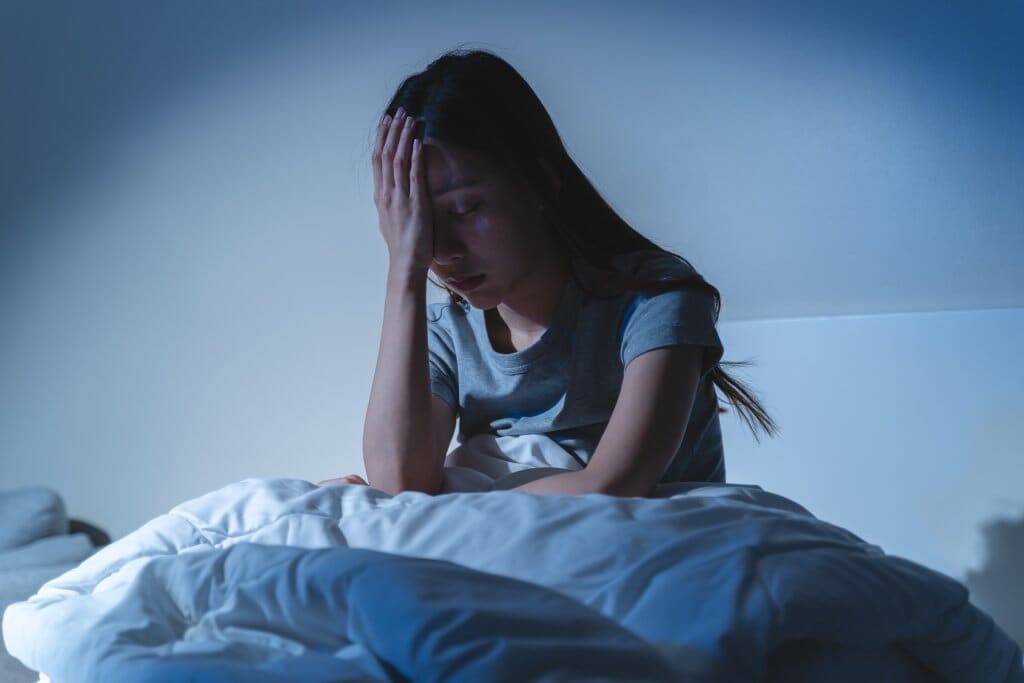Have you ever woken up at the same time each night? Or checked the time and you seem to always do it as the clock strikes 11:11? Well, it’s not as uncommon as you might think.
In fact, this could happen to the majority of people due to our sleep cycles. But if you typically wake up during the ‘witching hour’ (between 3 and 4 am), we are sharing why exactly that might be and what you can do to help prevent it.

Experts reveal why YOU wake up during the ‘witching hour’
The ‘witching hour’ is between the hours of 3-4 am and is typically associated with supernatural events. However, the reason you are staring at the clock at this time might be more normal than you believe and not often a cause of concern.
During a seven to nine-hour sleep period, we enter around four to five sleep cycles. These include light sleep, deep sleep, REM sleep and even attempting to fall asleep, which is part of a cycle. However, these sleep cycles last around 90 minutes, and nighttime awakenings are common when coming out of a sleep cycle.
But that’s not all, the more you are aware of the time you wake up, you could be more likely to continue waking up at that time as your brain responds to the cues of those multiple awakenings and assumes that you need to be awake at that time.
However, a consistent bedtime routine could also be behind you waking up through the night…
The time you go to bed could be the reason you wake at 3am
Do you go to bed at a set bedtime, waking up at the same time each morning? While that is recommended - particularly if you suffer from insomnia - this pattern could be behind you waking during the night.
Your circadian rhythm - otherwise known as your internal body clock - is regulated by daylight and a consistent pattern can help ensure that your brain understands when it is time to sleep, and wake, releasing the hormones needed to do so.
So, if you are in a pattern of going to bed at the same time during the week, you are more likely to regulate your circadian rhythm to wake up at set times. But, that’s not to say you should remove a routine from your bedtime. Far from it, in fact, as that is one way to avoid sleep deprivation.
Melatonin also declines from 3am, giving way to cortisol to wake you up
Similarly, melatonin - or your sleep hormone - peaks at 3 am and is required to help you sleep. From this point onwards, however, as melatonin levels decrease, cortisol levels increase.
Cortisol is your stress hormone, responsible for making you feel alert in the morning and helping you to get out of bed. At this time, this hormone starts to increase which could also culminate in nighttime awakenings. If you then give way to further things that keep you awake - such as your phone - you can then get stuck in a pattern of waking up during the night.
While this is a natural part of your circadian rhythm, there are things you can do to stop waking in the middle of the night and help lull you back to sleep.

Experts reveal how to stop waking up at 3 am
A number of factors could be behind your 3 am wake-up call, factors that you can change to prevent the witching hour awakenings.
- DON’T take naps from mid-afternoon onwards
It might be tempting to take a nap, particularly if you had a rough night from lack of sleep and waking up at 3 am. But naps taken too late in the day can see you enter a deep sleep cycle, which, if disrupted prior to ending naturally, can leave you feeling worse than before you went down for sleep.
If naps are necessary, we recommend napping for no longer than 20 minutes to prevent entering a sleep cycle and to stop you from experiencing that groggy feeling when you wake.
- Don’t lie in bed for more than 20 minutes if you struggle to fall asleep
This one might seem counterintuitive but remaining in bed while attempting to fall asleep - and failing - could be behind your nighttime awakenings. This is because you could begin to associate your bed with a place of stress, especially if you are consistently struggling to fall asleep.
Instead, get up, move around or go to a different room and do something that helps you relax. That could be something as simple as reading a book - but try to avoid using your phone, which could end up leaving you feeling more awake.
- If you smoke, do not get out of bed to smoke when you wake up
Research has revealed that those who smoke and get out of bed to do so after waking up are more likely to experience sleep disturbances than those who do not smoke. If this happens consistently, you could find yourself in sleep debt. Sleep debt is cumulative so the more sleep you lose, the more sleep is banked within the sleep debt and the worse you will feel the next day.
- Avoid spicy food several hours before bed
A meal featuring spicy food is best avoided before bed. In fact, try to avoid spicy food at least three hours before your bedtime. This is because spicy food can contain capsaicin which can elevate your body’s core temperature. As that rises, it can disrupt sleep.
- But don’t go to bed hungry
Going to bed hungry can leave you with low blood sugar. As your body is hungry, cortisol could begin to spike as your body tries to wake you up to get some food. So, if this happens to you, opt for food such as apples and peanut butter that aren’t too heavy and leave you struggling to digest them during the night.
- Make sure your bedroom is a space for sleep and intimacy
Your bedroom should always be a space for sleep and intimacy, nothing more. While we understand that you may have to use that room for other things, such as working, we recommend that, at night, you turn this into a space for sleep.
What that means is to remove any items from your workspace that could keep you awake, turn off the TV, dim the lights, and turn your room into somewhere you can relax. Try and keep this rule from 5 pm onwards so you begin to associate your room with a place where you can sleep.
- And don’t forget to sleep in a pair of clean socks…
Wearing socks to bed can help you sleep through the night, it’s official. The number of awakenings during the night was 7.5 times lower than the group without socks, one study discovered. Sleep efficiency also improved by 8% by wearing socks to bed.
So, if you are looking to reduce the number of times you wake during the night, a pair of clean socks could well be the answer. However, ensure that they are clean socks as our research uncovered that socks worn all day contained faecal droppings…
Your mattress could also be responsible for your sleepless nights, especially if you have had it longer than eight years. Check out our range of brand-new mattresses, designed to support your body and keep you asleep.











